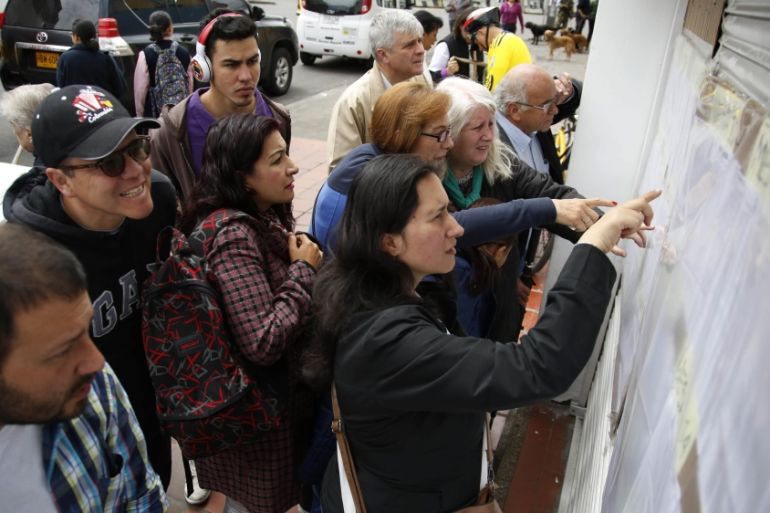Colombia voters favour pro-peace candidates
Candidates opposed to peace talks suffer losses in regional polls as government engages FARC rebels in talks.

Many observers said Sunday’s regional elections in Colombia were going to be the most important in years.
And they were probably right.
Colombians hope these were the last polls celebrated in the country with the conflict still raging on.
The over 1,000 mayors, 32 governors, and municipal councils elected will most likely be tasked with implementing the reforms that will come once a peace deal with the rebel group, FARC, is signed.
Peace negotiations are moving forward but new obstacles could arise and what will happen in a post-conflict Colombia is highly debated.
For now we can take a look at who Colombians elected for the next four years.
Peaceful elections
First of all, these have been the most peaceful elections in many decades. And armed groups have mostly stayed out of the proceedings.
Yet, at least six candidates have been killed in past months. But compare that with 41 murdered in 2011 and you get an idea of the progress.
However, while the level of violence has tapered off, fraud and corruption remains rampant.
Alejandra Barrios, the director of the MOE, a Colombian electoral observation organisation, says, “the reduction in violence is helping us raise the curtain on a new relationship between corruption and politics in the country. We never had a strong tradition of democratic culture, transparency, and participation. But what we are seeing now are corrupt politicians who are introducing new mechanisms to stay in power without the threat of weapons”.
A worrying trend in a country hoping to start anew once its old conflict is left behind.
Political scientist Arlene Tickner says the elections leave a complex scenario of positive elements to highlight and worrying new factors.
“Several independent candidates were elected,” Tickner said, “who I think will do a terrific job of implementing any type of peace agreement that the government signs with the FARC and the ELN guerrillas”.
“Notwithstanding these positive aspects I’m very concerned by the fact that a considerable number of both governorships and mayorships were taken by people that have links with the paramilitaries or with drug traffickers.
“These are not people that will agree with what is signed in Havana between the government and the guerrillas. And to what extent there will be any type of political willingness to implement and cooperate with the agreements.”
Winners and losers
Overall Colombians seemed keen on rejecting the most polarising politicians and strengthening the hands of current President Juan Manuel Santos as he looks to secure a peace deal with the FARC.
As a consequence the far-left and the far-right candidates suffered.
In the capital, Bogota, former mayor Enrique Peñalosa handed a powerful defeat to the country’s left that had been running this city for 12 years.
Voters returned him to office hoping he can revamp the city badly in need for new infrastructure and relief from worsening safety.
While the party of former right-wing President Alvaro Uribe, a staunch critic of the peace process, ended almost empty handed.
Uribe’s Democratic Centre party won in just two gubernatorial races and lost in their stronghold of Medellin, Colombia’s second city.
The leftist party UP or Patriotic Union, which had been practically wiped out by right-wing paramilitary groups in the 1990s, deserves special mention.
Their candidates didn’t do particularly well, but they are back and have been able to campaign and share their ideas with voters.
It is a fundamental step for a more inclusive, democratic, and truly peaceful country.